
Concept explainers
To determine: The shortest route from node 1 to each of the other six nodes.
Explanation of Solution
Given diagram:
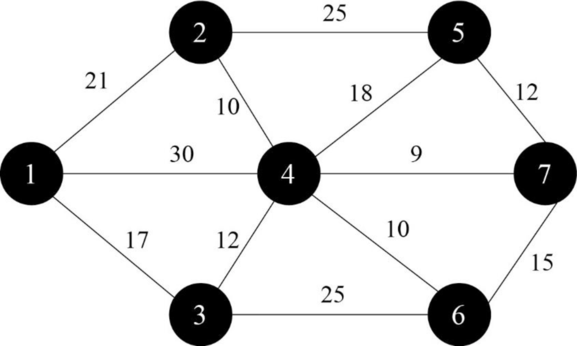
Determine the shortest route:
Step 1:
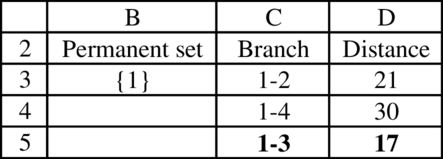
The initial node from the given diagram is Node 1. In the above table, nodes from Node 1 should be considered. While comparing the distance of each branch, 1-3 has the minimum distance. Hence, it was chosen. The diagram for the above table is as follows:
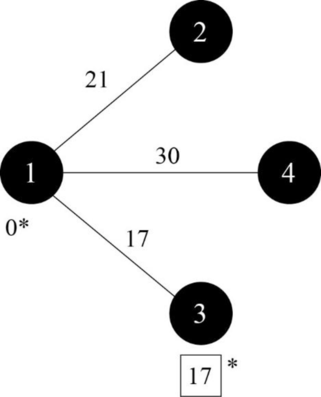
Step 2:
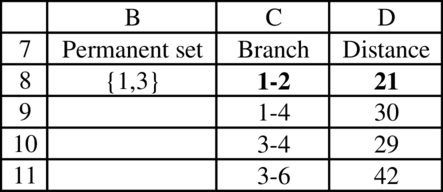
In the above table, nodes from Node 1 and Node 3 (as Node 3 was chosen in step 1) should be considered. However, the chosen branch should not be considered again. While comparing the distance of each branch, 1-2 has the minimum distance. Hence, it was chosen. The diagram for the above table is as follows:
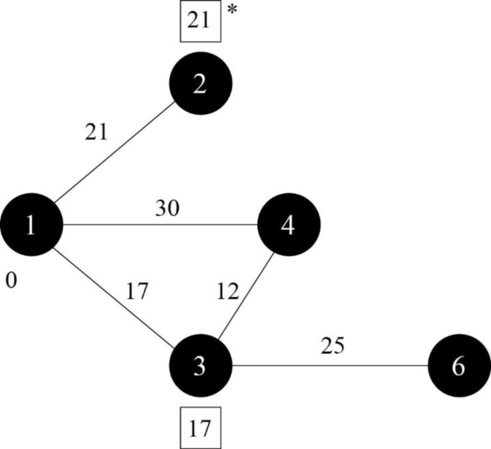
Step 3:
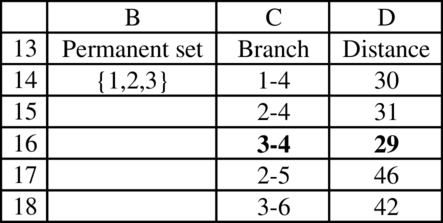
In the above table, nodes from Node 1, Node 3, and Node 2 (as Node 2 was chosen in step 2) should be considered. However, the chosen branch should not be considered again. While comparing the distance of each branch, 3-4 has the minimum distance. Hence, it was chosen. The diagram for the above table is as follows:
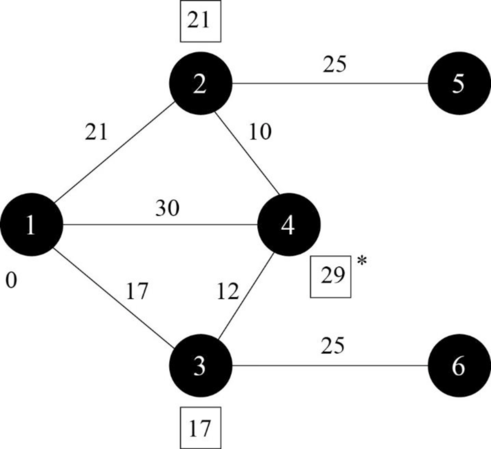
Step 4:
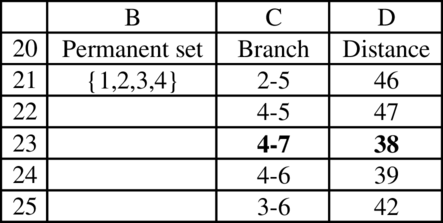
In the above table, nodes from Nodes 1, 3, 2, and 4 (as Node 4 was chosen in step 3) should be considered. However, the chosen branch should not be considered again. While comparing the distance of each branch, 4-7 has the minimum distance. Hence, it was chosen. The diagram for the above table is as follows:
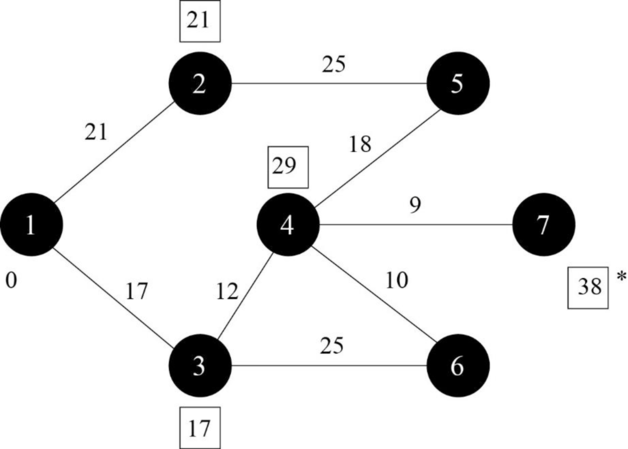
Step 5:
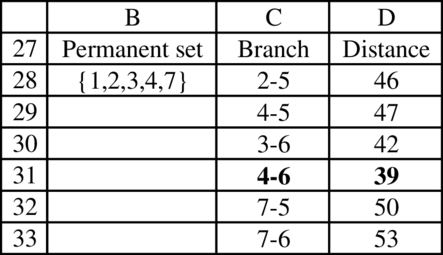
In the above table, nodes from Nodes 1, 3, 2, 4, and 7 (as Node 7 was chosen in step 4) should be considered. However, the chosen branch should not be considered again. While comparing the distance of each branch, 4-6 has the minimum distance. Hence, it was chosen. The diagram for the above table is as follows:
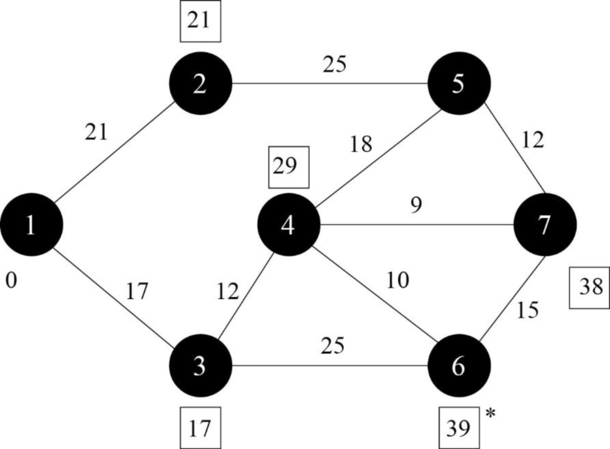
Step 6:

In the above table, nodes from Nodes 1, 3, 2, 4, 7, and 6 (as Node 6 was chosen in step 5) should be considered. However, the chosen branch should not be considered again. While comparing the distance of each branch, 2-5 has the minimum distance. Hence, it was chosen. The final node of the shortest route is Node 5 after Node 1, Node 3, Node 2, Node 4, Node 7, and Node 6 (all the given nodes were chosen for the shortest route). Hence, the steps should be stopped here. The diagram for the above table is as follows:
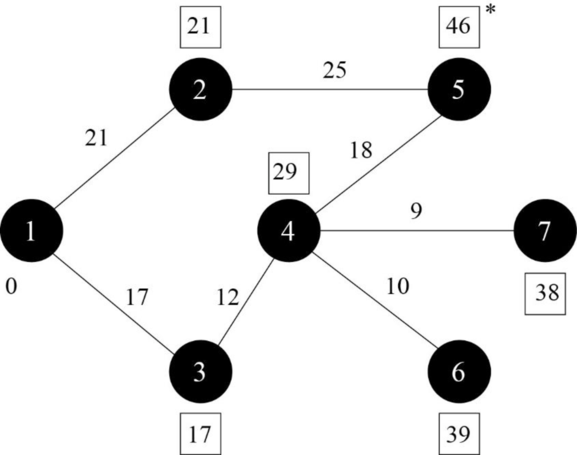
Formulae to determine each distance from step 1 to step 6:
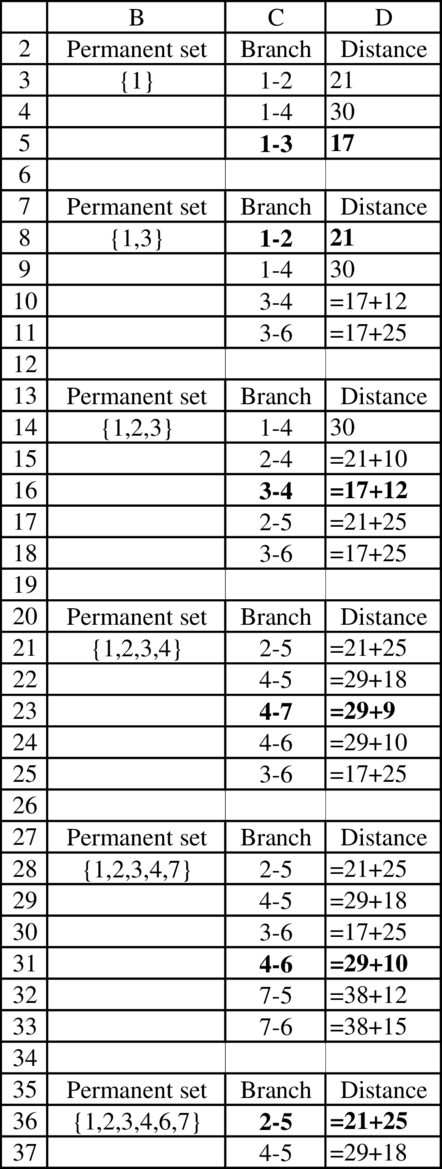
Final diagram and the shortest route:
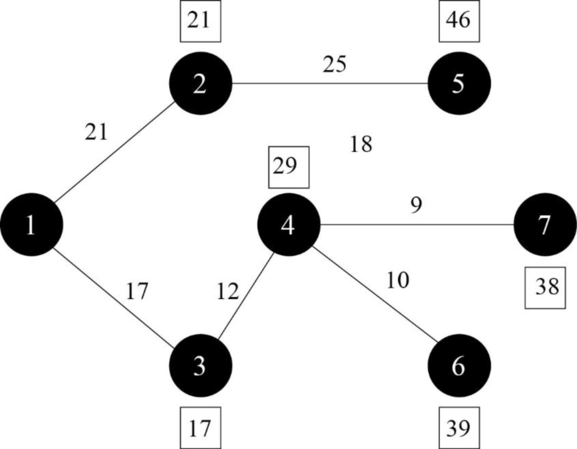
Hence, the shortest route should have the following branches:
1-3, 1-2, 3-4, 4-7, 4-6, and 2-5
Want to see more full solutions like this?
Chapter 7 Solutions
EBK INTRO.TO MANAGEMENT SCIENCE
- PepsiCo South Africa says the incident where a woman discovered part of a rodent in her loaf of bread, is anisolated occurrence.Durban woman, Nombulelo Mkumla, took to social media last week to share how she discovered the rodent.In a lengthy Facebook post, she said she purchased the loaf of bread from a local shop after work on August 27.For the next days, Mkumla proceeded to use slices of bread from the load to make toast."Then, on the morning of August 31, I took the bread out of the fridge to make toast and noticed something disgusting andscary. I took a picture and sent it to my friends, and one of them said, 'Yi mpuku leyo tshomi' [That's a rat friend]“."I was in denial and suggested it might be something else, but the rat scenario made sense - it's possible the rat got into thebread at the factory, and no one noticed," Mkumla said.She went back to the shop she'd bought the bread from and was told to lay a complaint directly with the supplier.She sent an email with a video and…arrow_forwardThe deaths are included in the discharges; this includes deaths occurring in less than 48 hours and postoperative deaths. Rehabilitation had 362 discharges, 22 deaths, 1<48 hours, 0 Postoperative. what is the gross death rate for the rehabilitation service?arrow_forwardA copy machine is available 24 hours a day. On a typical day, the machine produces 100 jobs. Each job takes about 3 minutes on the machine, 2 minutes of which is processing time and 1 minute is setup time (logging in, defining the job). About 20 percent of the jobs need to be reworked, in which case the setup time and the processing time have to be repeated. The remainder of the time, the equipment is idle. What is the OEE of the equipment?arrow_forward
- How do you think we can keep updating Toyota's ideas as new technologies come out and what customers want keeps changing?arrow_forwardGiven how TPS has helped change things in so many fields, do you think there are parts of it that might be hard to use in areas that aren’t about making things, like in healthcare or services? If so, why do you think that might be?arrow_forwardDo you feel there is anything positive about rework?arrow_forward
- Do you think technology can achieve faster setup times? How would it be implemented in the hospital workforce?arrow_forwardIn your experience or opinion, do you think process changes like organizing workspaces make a bigger difference, or is investing in technology usually the better solution for faster setups?arrow_forwardHave you seen rework done in your business, and what was done to prevent that from occurring again?arrow_forward
- Research a company different than case studies examined and search the internet and find an example of a business that had to rework a process. How was the organization affected to rework a process in order to restore a good flow unit? Did rework hurt a process or improve the organization's operational efficiency? • Note: Include a reference with supportive citations in the discussion reply in your post.arrow_forwardSetup time is very important in affecting a process and the capacity of a process. How do you reduce setup time? Give examples of reducing setup time. Please Provide a referenecearrow_forwardDo you think TPS was successful? If so, how? Are there other companies that have used TPS? If so, give examples. Please provide a referencearrow_forward
 Practical Management ScienceOperations ManagementISBN:9781337406659Author:WINSTON, Wayne L.Publisher:Cengage,
Practical Management ScienceOperations ManagementISBN:9781337406659Author:WINSTON, Wayne L.Publisher:Cengage, Operations ManagementOperations ManagementISBN:9781259667473Author:William J StevensonPublisher:McGraw-Hill Education
Operations ManagementOperations ManagementISBN:9781259667473Author:William J StevensonPublisher:McGraw-Hill Education Operations and Supply Chain Management (Mcgraw-hi...Operations ManagementISBN:9781259666100Author:F. Robert Jacobs, Richard B ChasePublisher:McGraw-Hill Education
Operations and Supply Chain Management (Mcgraw-hi...Operations ManagementISBN:9781259666100Author:F. Robert Jacobs, Richard B ChasePublisher:McGraw-Hill Education
 Purchasing and Supply Chain ManagementOperations ManagementISBN:9781285869681Author:Robert M. Monczka, Robert B. Handfield, Larry C. Giunipero, James L. PattersonPublisher:Cengage Learning
Purchasing and Supply Chain ManagementOperations ManagementISBN:9781285869681Author:Robert M. Monczka, Robert B. Handfield, Larry C. Giunipero, James L. PattersonPublisher:Cengage Learning Production and Operations Analysis, Seventh Editi...Operations ManagementISBN:9781478623069Author:Steven Nahmias, Tava Lennon OlsenPublisher:Waveland Press, Inc.
Production and Operations Analysis, Seventh Editi...Operations ManagementISBN:9781478623069Author:Steven Nahmias, Tava Lennon OlsenPublisher:Waveland Press, Inc.





